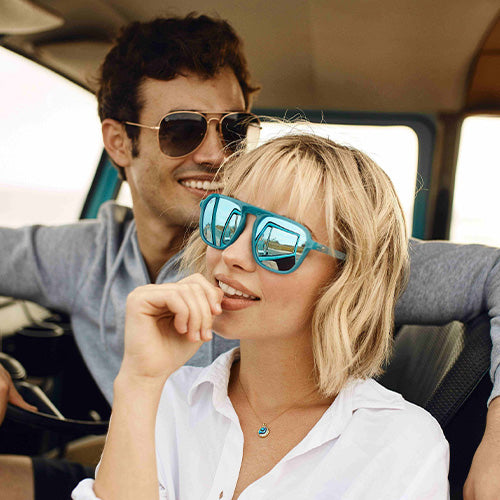While polarized sunglasses are amazing, they’re not appropriate for every person in every situation. So when should you slip on a pair of polarized shades, and when might non-polarized lenses be better? Let’s answer that question with a deep dive into some potential drawbacks of polarized glasses.
POLARIZED SUNGLASSES AND DIGITAL DEVICES
Designed to counter glare in outdoor situations, polarized sunglasses aren’t well-suited for reading digital screens. The lenses that block horizontal light can also make LCD screens and similar displays appear fuzzy. Why? These digital devices have light-modulating features that control the direction of the light they emit. Polarized glasses may be great for cutting down on horizontal light from road glare while driving. But looking down at your smartphone or digital dashboard display could present a problem.
SNOW HAZARDS AND POLARIZED SUNGLASSES
Should you wear a pair of polarized shades when you hit the slopes? There’s no right answer to that one! On the one hand, polarized lenses seem perfect for snowy landscapes. The glare reflecting from snow can be intense, and a good pair of polarized sunglasses can make a dramatic difference in vision. But there’s another consideration: white colors. Polarized lenses can make distinguishing between different shades of white more difficult. And that could be a problem if you’re looking out for ice patches or shifts in hilly terrain as you’re flying down a mountain.
NIGHTTIME DRIVING AND POLARIZED LENSES
It’s a bad idea to wear any type of sunglasses while driving at night. That’s even more true with polarized sunglasses. While polarized lenses can cut down on the glare from oncoming traffic, the dangers far outweigh any benefits. Designed to block light, polarized lenses make the wearer’s view dimmer in every environment. Add that reduction in light to the already low-light situation of nighttime driving, and the vision reduction could hit a dangerous level.
WEIRD WINDOWS WITH POLARIZED LENSES
Yes, polarized lenses can make windows look weird! Especially car windshields. Grid or stripe patterns can appear when you’re wearing polarized lenses, a result of the tempering process used to strengthen auto glass. These distortions can also appear as rainbows and are not limited to cars; houses and buildings with similar shatter-resistant glass may look odd through polarized lenses. While some people may not mind the patterns on the glass, others could find it distracting enough to create a safety issue while driving.
VISUAL DISORIENTATION WITH POLARIZED SHADES
While often a minor concern, polarized lenses can alter the wearer’s perception of images. And this perception shift can lead to a slight feeling of dizziness or disorientation. This sense of dizziness is most common in environments with normal light levels. Some people have reported that when wearing polarized lenses, their depth perception changes to make things look more 3-D. These effects are small but still noticeable for some wearers.
POLARIZED GLASSES MAY NOT FIT YOUR LIFESTYLE
In several ways. You may have a job that requires ultra-clear vision. People who operate heavy machinery, for instance, are often prohibited from wearing polarized lenses over concerns that the light-filtering properties could alter vision too much. Airline pilots can’t wear polarized lenses because the cockpit has too many screens and digital instrument panels.
Or the light filtering of polarized lenses could just be too much for you. One has to balance the anti-glare properties that polarized lenses provide with a simple fact: the world can appear slightly dimmer while wearing polarized shades.
SPORTS PERFORMANCE MIGHT SUFFER
With some sports, the slight shift in-depth perception one experiences while wearing polarized sunglasses could be a factor. This mostly applies to ball sports, including baseball, softball, and tennis. In these sports, judging the speed, distance, and trajectory of a ball can be crucial. And take place in a split second. So even the slightest skew in depth perception could make the difference in connecting with the ball or not.
While polarized sunglasses could be fine for open-road cycling, they may not serve as well with more intense mountain biking. For one, mountain bike trails often pass through forested areas with shade. This all but eliminates the issue of light reflecting from flat surfaces, which could be an issue with other types of biking. And if you’re mountain biking at a high speed, the ability to make out the oncoming terrain is crucial for avoiding spills.
What are some sports that benefit from polarized lenses? Fishing tops the list, and cutting down on glare from the water’s surface may make it easier to spot a catch. Boating and sailing are tailor-made for polarized lenses, and running (especially near a body of water) may benefit from polarized lenses.
NON-POLARIZED GLASSES AS ALTERNATIVES
If you often find yourself in one or more of these situations in which polarized sunglasses don’t serve your needs, consider a pair of non-polarized Knockarounds.
Purposefully non-polarized, Campeones are designed with active lifestyles in mind. They’re perfect for sports like baseball, in which clear, sharp vision is a must. Campeones offer excellent depth perception with our signature Knockterra™ Lens Tech. And these stylish wraparound shades excel in outdoor environments where UV protection is a must. From cycling to running, there’s no worry about clouded visibility with Campeones thanks to a hydrophobic lens coating that repels water and oil.
So, should you go with polarized eyewear or non-polarized sunglasses? Why choose? With Knockaround’s famed affordability, you can get two (or more) high-quality pairs of sunglasses and always have the right pair of shades for the right situation.
Written by William McCleary for Knockaround









Top 20 Sunniest Cities in the United States
What Do Polarized Sunglasses Do?